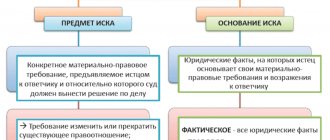Is it possible to deregister?
It is possible to remove a child from registration. Especially when it comes to adult children. Parents of a grown son or daughter have the right not to provide registration in their home. And if an adult child does not live at his place of registration, then it is easy to remove him from registration. It is advisable to do this peacefully, but if the son or daughter refuses to go through the discharge procedure, everything can be done through the court.
Minor
If necessary, they can also be issued if certain conditions are met, but this is done only in court. During the investigation, it becomes clear where the small citizen lives, who is related to the owner of the apartment, how and under what circumstances he was registered in this area, etc. If there are no reasons to prevent this, the discharge of minors is carried out without any difficulties.
The following circumstances should be taken into account:
- The little citizen will not be discharged from the apartment unless registration is planned in another place. It is also necessary that the new place of registration is not worse than the previous one; the minor must receive the same number of meters for living or more.
- If the child is one of the owners of the apartment, then the discharge procedure is carried out only with permission from the guardianship and trusteeship authorities.
- The offspring can be discharged from the apartment only together with one of the parents. If the father and mother remain registered in the same place, then their son or daughter will remain with them, and according to the law it will not be possible to discharge them.
Since deregistration affects the rights of the child, the court will begin to comprehensively study the case.
Without the child's consent
Until a small citizen has reached the age of 10 years, his consent to discharge and registration is not required. In the future, he must confirm that he does not object to this procedure. This applies to cases where a minor is registered in the parents’ apartment. His father and mother cannot deregister him without his consent.
If the parents are divorced, and the offspring lives with the mother, but is registered in the father’s living space, then the possibility of discharge exists. To do this, it is necessary to prove in court that he does not live at his place of registration. If the father pays child support, the court will make a positive decision on the claim.
A child who cannot be evicted even through court
There are also minors who cannot be discharged even through the court, even if there are good reasons. These include:
- children-owners of housing (those who are indicated as copyright holders in the extract from the Unified State Register or certificate of ownership);
- those living under a will (if the testator prescribed their right to live in the will) - even if the apartment was sold to a new owner;
- minors under 14 years of age, if they do not have an alternative residential address;
- children who refused to privatize the apartment;
- the child does not temporarily live in the apartment for a good reason - he is being treated somewhere or studying;
- the owner of an apartment or share will not be able to register his minor child (son or daughter) or grandson/granddaughter.
In these cases, you will either have to wait until the child reaches the age of majority, or negotiate the voluntary discharge of the child with his parents, or change the title owner.
Is it possible to discharge a minor without the consent of the mother?
During a divorce, the question sometimes arises of how to remove a child from the father’s apartment without the mother’s consent. This is possible under the following circumstances:
- The father pays child support for his offspring. In fact, they are not members of his family, so they can be discharged from his living space. Especially if the child’s place of residence is the mother’s home.
- The mother has been deprived of parental rights. In this case, she cannot prevent the father or guardian of the son (daughter) from changing the place of registration. The court may interfere with this if the change of place of registration entails a deterioration in living conditions.
There are also cases when the minor is not closely related to the owner of the apartment or is not a relative at all. This happens when parents turn to a distant relative with a request to register a child, or when buying housing with an encumbrance. Then, to remove minors from registration, you must go to court.
Notarized obligation to leave the apartment
- Let's figure out when it is necessary to have an apartment purchase and sale agreement certified by a notary
But in practice, this agreement cannot always be observed by a bona fide real estate seller due to circumstances beyond his control.
A note is made that all points of the obligation are clear and the information provided is true. Next, the signatures of the parties are placed, certified by a notary and entered into the register.
One day a woman came to me and needed to sell her apartment. It turned out that she was a passport officer for the HOA. I gave her a big discount for her help in completing the transaction, and now I consult with her on issues of extracting or registration. These instructions are written based on her experience.
However, Rosreestr is reluctant to accept documents in simple written form, and now it even wants to shift all responsibility for the transaction to notaries. Indeed, starting from 2021, the treasury of the Russian Federation will compensate for the losses of bona fide purchasers for the loss of rights to the only housing.
They didn’t sign up for me either, just think, before there were 2 people, now there are 2 people. The main thing was that the apartment was vacated, and as it turned out, I think my patience would have been enough for six months. Extra legwork for those who have time. Only sometimes for some reason they think that others also have time and jump off to do something at their whim.
Moreover, since you were registered in this apartment at the time of privatization and did not participate in the privatization, then currently, being registered there, you have a lifelong right to use this apartment. If you deregister voluntarily, this may mean your renunciation of the right to lifelong use of this apartment.
Most often, citizens apply for an extract for the purpose of a planned move to another place of residence and, accordingly, subsequent registration. This is the fastest and most convenient option. In addition, it is possible to avoid all the hassle associated with the deregistration process. Thus, a person registered in a new place is automatically discharged from the previous one.
There is a distinctive feature of this procedure for those liable for military service: having received a referral from the FMS, you should go to the military registration and enlistment office at your place of residence to have you deregistered. After this, you can complete the deregistration.
A former family member of the owner who uses residential premises on the basis of a court decision made taking into account the provisions of part 4 of this article has the rights, bears the duties and responsibilities provided for in parts 2 - 4 of this article.
Depending on the method, you can check out of the apartment and then register at a new address, or you can not do this. When writing an application for registration in a new place, a citizen is automatically registered from the old address.
Is it possible to notarize a document with guarantees of an extract at my first request with the person who asks to register it in my privatized apartment?
Extract without personal presence
And another question: if we draw up such an agreement, can we simply register it with a notary or are our signatures under all the terms sufficient?
In the event of termination of family relations with the owner of a residential premises, the right to use this residential premises for a former family member of the owner of this residential premises is not retained, unless otherwise established by an agreement between the owner and the former member of his family.
The Civil Code of the Russian Federation allows children to be deregistered only if in the future the child will be registered in a new living space with any of the parents or legal representatives (guardians). The FMS authorities deal with registration issues.
How is a notarized obligation to check out of an apartment completed?
V
- How is a notarized obligation to check out of an apartment completed?
AND ABOUT. Recommendations: Usually, when discussing the procedure for completing a transaction for the purchase and sale of an apartment, the parties - the seller and the buyer of real estate - agree that the former owner and other persons registered (registered) in the apartment he is alienating will be deregistered (registered) in advance, i.e. .
To perform this type of notarial act, you must have with you a certificate for maternity capital, passports of your husband and wife, birth certificates of children, documents for an apartment, a document on state registration. registration of property rights, loan agreements and a small amount of money.
For third parties who do not act as parties to the obligation, obligations do not arise. However, in cases provided for by the Civil Code of the Russian Federation, other legislative acts or the terms of an obligation certified by a notary, rights may be created for third parties in relation to the parties to the obligation.
But here the question arises: according to this agreement, she has the right to live with me whenever she wants... or can I stipulate in this agreement any conditions that we agree on with her? And another question: if we draw up such an agreement, can we simply register it with a notary or are our signatures under all the terms sufficient?
Can anyone tell me when and how best to discharge a minor child from the apartment for sale? The child is not the owner. Registered in the apartment with me. The buyer asks now (before the transaction) to begin the registration procedure, but for now we have nowhere to go, except to the husband’s parents, where the husband himself is registered. I heard that you can check out after the transaction.
It must be borne in mind that FMS employees do not encourage the intervention of third parties. This is due to their desire to avoid fraud. Therefore, it is important to talk in advance with the relevant authorities and agree on deregistration at the place of residence of the homeowner in his absence.
Notarial obligation to deregister sample
I advise you to read all the options and choose the most suitable one (some points in the instructions are repeated). A small addition: For a long time there are no such concepts as registering or checking out of an apartment. Protests: Protest of a bill for non-payment, non-acceptance and undated acceptance and certification of non-payment of a check for 1% of the unpaid amount, but not more than 20,000 rubles.
Source: https://re-mebeli.ru/dolgovye-spory/6435-notarialnoe-obyazatelstvo-o-vypiske-iz-kvartiry.html
Legislative acts
If the former owner refuses to deregister, according to Article 35 of the RF Housing Code (clause 1), eviction can only be achieved by a court decision.
If an agreement is drawn up obliging the former owners to sign out after the transaction is completed, then this argument will be enough for the court to render a verdict in favor of the buyer.
But even if you purchased an apartment without taking care of it, the law is still on your side.
In particular, Article 209 of the Civil Code of the Russian Federation (clause 1) will help you, which states that the owner retains the right to use and freely dispose of his own property.
Read more: How to confirm an interview appointment in a letter
Also, Article 235 of the Civil Code of the Russian Federation (clause 1), depriving the previous owner of the right to use and reside in the living space after its sale.
And also Article 304 of the Civil Code of the Russian Federation, which gives you the right to demand an extract from the previous owner.
If several people are registered in the apartment, Article 292 of the Civil Code of the Russian Federation (clause 2) will come to the rescue, allowing family members of the old owner to be evicted through the court.
What to do if you bought an apartment with a registered person
Even though the law fully supports the buyer in the current situation, the old owners can be evicted without their personal consent only through the court and nothing else.
Before going to court, it is worth collecting all the necessary documents, namely:
- Passport.
- A purchase and sale agreement that was concluded with an unscrupulous seller.
- Papers that can confirm your right to ownership of the purchased property. Such documents include a certificate of ownership or an extract from the unified state real estate register for an apartment. The first ones stopped issuing back in 2016, so only the extract is relevant for new transactions. It must be paper.
- Extract from the house register. It contains the data of all persons registered in the apartment, including former owners.
- A receipt that confirms that you have paid the state fee.
- Statement of claim.
When all the documents have been collected, it is time to go to court.
The algorithm of actions is as follows:
Read more: How to transport live crayfish over long distances
It is fundamentally important to contact the local court at the address where your home is located. You do not have to file the claim yourself. A hired lawyer can do this for you if he has a power of attorney signed by you.
What is a notarial obligation to deregister?
The most weighty argument in court is the notarial obligation to deregister.
This is a document that is concluded before the act of buying and selling real estate. It obliges the seller to check out of the apartment within a certain period after the transaction is completed.
A notarized release obligation simply needs to be drawn up if you are buying an apartment with registered residents, since with a signed obligation, the seller does not have the legal right to be registered in the sold apartment.
A sample of a notarial obligation to deregister is as follows:
Subtleties of deregistering the former owner or tenants
Trial is not a quick process. At best, the process will take more than two months. So, if you decide to go to court, be prepared to endure temporary inconvenience.
As for the cost, according to the law you only need to pay the state fee - 300 rubles, but do not forget that, most likely, you will have to pay for the services of a lawyer. And a good lawyer is not cheap. Professional services can cost the plaintiff tens of thousands of rubles.
As mentioned above, the court will decide in favor of the buyer, since the law is on his side. However, it is better to entrust the drafting of a statement of claim to a lawyer . A person with a legal education, knowing all the intricacies, will be able to draw up an application competently.
Possible problems when discharging former residents
There are four situations in which difficulties may arise with terminating registration of old tenants in an apartment:
Read more: Act of acceptance of transfer of work records form download
This document states that a specific person who is not an heir is granted the right to live in this apartment.
In all other cases, you have every right to evict the old tenants from the purchased apartment.
Discharge of old tenants from a purchased apartment is a rather painstaking and lengthy procedure, but most likely you will get a positive result. Before purchasing, check all the documentation related to the home you are purchasing, check to see if anyone is registered there who cannot be discharged by law.
Is it possible to include a condition in the contract that the seller receives part of the money (for example, $10,000) only when everything is paid out? 16.10.2006 21:52:20, Polett
| A very real situation - they ask you to wait until the end of the draft. We sold it this way, and our customers agreed to it. But this is purely a matter of trust. If you are not confident in these people, it is better to buy in two months. Such an obligation will not have legal force. You can include the obligation to sign out in a couple of months in the Sales and Purchase Agreement. Then, if this condition is not met, the contract will be considered invalid (maybe the lawyers will correct me?). This will mean that the sellers will get their apartment back, and the buyer his money. One caveat: the contract must indicate the full amount. And in addition, if the seller has already spent the money, then he can pay you for the rest of his life for three kopecks. |
Source: https://kalibr20.ru/urkons/notarialnoe-objazatelstvo-o-vypiske-iz-kvartiry/
Conditions of discharge
To discharge a minor, the following conditions must be met:
- Availability of registration space. At the same time, the new living space should not be worse than the previous one.
- Planned registration of the child at the place of registration of one of the parents.
- Consent of the minor (if he is 10 years old).
- Consent of guardianship authorities. It is required if the minor is one of the owners of the housing from which he is planned to be removed.
- The consent of both parents is desirable. If this condition is not met, the father or mother may contact the guardianship authorities with a complaint.
You can find out whether it is possible to remove a minor from registration from a lawyer. Each situation is individual and all circumstances must be assessed.
How to deregister and check out of an apartment using a power of attorney
Registration, as a designation of connection to a place of permanent residence, was abolished on January 1, 1992. The term itself is now more familiar to hearing. Registration was replaced by registration at the place of residence, but the process remained virtually unchanged.
To carry out actions related to registration or deregistration, you need to collect the necessary documents and spend some time waiting.
Is it possible to be discharged and how can one be discharged using a power of attorney if it is not possible to appear at the migration authorities in person? Let us consider in detail in accordance with changes in legislation.
What you need to know about the deregistration process
To deregister at the address where a citizen resides temporarily or permanently, personal presence at the FMS office is required. Such a place will be: passport office, housing department, hostel administration, Multifunctional centers.
A mark of departure is placed in the passport, house or apartment register. Deregistration at the place of residence is carried out in accordance with the main resolution adopted by the Government of the Russian Federation in 1995 under number 713.
According to this document, changing your permanent place of residence requires a change of registration.
Temporary absence does not require discharge - temporary registration is sufficient.
The registration institute ensures the implementation of citizens' rights; the ability to fulfill obligations to society and the state; forms migration policy; models the development of society.
Let's consider one of the registration actions: deregistration. The main requirement is personal presence when submitting the application.
Currently, reporting the place of travel has become optional, and the application itself can be submitted through the government services portal or by mail. The extract is carried out within three to seven days, depending on the conditions and place of submission.
Cases of deregistration in one day deserve special mention. As a rule, such cases are rare and require a compelling reason.
How to deregister: procedure
At first glance, the question of how to discharge a person from an apartment does not cause much difficulty. But existing organizations that have the authority to seize and transfer documents to the FMS (if this is not a department of the service) differ in their different approaches to the deregistration procedure. The list of documents also differs, the human factor and the different level of competence have not been canceled.
How to deregister an absent family member if the time for completing the transaction is limited and the person does not have the opportunity to be present at the migration authorities in person? What documents may be required? You should start the discharge process by visiting the service responsible for registration:
- Federal Migration Service and its divisions.
- Multifunctional Center.
- Passport Office.
- The authorized self-government body in the HOA.
- Passport officers in the housing and communal services department.
Persons responsible for registration and discharge are required to provide you with a list of necessary documents. The next process is to collect certificates and necessary papers. It is worth separately checking with the authorized person about a sample power of attorney for leaving an apartment (where to get it and how to fill it out correctly).
It’s worth trying to simplify the task and get the necessary information on the government services portal. The resource not only informs about the necessary documents, but also allows you to submit an application to the Federal Migration Service, which greatly simplifies deregistration. The application form and sample form are available for downloading from government services and legal websites.
A second visit to the migration service departments should be made with a full package of documents.
There is no state fee for completing registration actions if the deadlines are met. This fact is enshrined in law, at the federal level in 2004, by law No. 127. The fee is paid by stateless persons and foreigners, as well as in case of cancellation of registration through the court. In this case, the amount of payment is determined by the court.
The most difficult process in the modern institution of registration is deregistration from an apartment by power of attorney (read how to register by power of attorney from the owner on our website). There are different cases when a person is not able to appear in person at the migration office.
Inability to arrive in another city upon departure, long business trip, living abroad, illness, shift work and others.
So is it possible to discharge a person from an apartment in his absence? Such situations are resolved by issuing a notarized power of attorney. In this case, deregistration is carried out by the person for whom the power of attorney is issued.
Registration of a power of attorney
A power of attorney to deregister and check out of an apartment is issued by the person who needs to check out. The notary is provided with complete and reliable information about the applicant and the authorized representative.
The document defines the range of responsibilities assigned to the trustee who replaces the absent citizen. The certified document for deregistration and the principal’s passport must be sent by mail or courier service.
Information required for the notary:
- valid civil passport of the principal;
- details of the authorized person's valid passport;
- description of the powers of the trustee;
- validity period of the power of attorney.
The document must contain, in addition to the above text:
- information about the date and place of the agreement;
- personal data of the notary who executed the document;
- information about the license on the basis of which notarial activities are carried out;
- official seal of a notary with the inclusion of an individual number assigned by Ros.Reestr;
- information about payment and cost of services.
Let's summarize: In order to correctly issue a power of attorney to check out of an apartment, the sample must be studied in advance and all the required information must be prepared. The successful completion of the process depends on the correctness and reliability of the information.
What documents may be needed for discharge?
An approximate list of documents is necessary in order to know how to deregister without delay. You will need:
- Application for deregistration.
- Valid civil passport.
- Birth certificates of minor children.
- Marriage or divorce certificate (if it is necessary to confirm a change of surname, etc.).
- Notarized consent of the absent parent for the discharge of a minor child.
- Power of attorney certified by a notary (if necessary, check out of the apartment by power of attorney).
- Document on home ownership.
- House or apartment book.
- Contract of sale.
- Travel certificate, sick leave or other certificate (for urgent processing)
Some nuances of the discharge of citizens
It is impossible to discharge a person from an apartment under a general power of attorney to dispose of property. If the tenants intend to stop renting the apartment, you have the right to cancel the temporary registration at the place of stay without a power of attorney.
The grounds for termination of registration are: relocation, fictitious registration, death, long absence, court decision.
You can make an extract without the presence of a person if you have a power of attorney, executed and notarized in favor of the authorized person.
Source: https://zen.yandex.ru/media/id/5a7ebe61f03173f63cff98b5/kak-sniatsia-s-ucheta-i-vypisatsia-iz-kvartiry-po-doverennosti-5a92d3673c50f76e6d69c6fb
Where to go
The procedure for checking out of an apartment is carried out at the passport office. This is where you should go. The easiest way is to write an application to register a minor in a new place. In this case, he will be discharged and prescribed immediately. Since a minor cannot remain without parental care, one of the parents will be registered with him. If the situation is specific, passport office employees may require a court decision or permission from the guardianship authorities. Then you will have to contact these authorities.
Rules for filling out applications
The outcome of the case depends on whether the application to various authorities is drawn up correctly. Each of the statements has its own characteristics .
Claim in court
The application to the court is submitted at the actual place of residence of the child .
The claim must first of all be justified, therefore the application must indicate the requirements that comply with current legislation.
First of all, indicate the subject of the claim - recognition of the citizen as having lost the right to use the premises. This is what should be the subject of the lawsuit.
At the end of the application, ask the court to also recognize the minor as having lost the right to use the premises.
Discharge from the premises will occur subsequently on the basis of this decision, since the court does not discharge anyone, this will then be dealt with by the relevant authorities .
Further in the application, indicate the reasons for this decision.
We talked about how claims for forced deportation are drawn up in various situations in a separate article.
In the Federal Migration Service
An application to the Federal Migration Service is written by both parents and the child after 14 years of age. The easiest way to obtain such an extract is by registering at a new address.
In this case, citizens submit an application to the place of new registration with a request to register the minor.
Employees of the Federal Migration Service carry out registration, and deregistration from the old place of residence occurs automatically , without the participation of applicants.
To the guardianship authorities
The guardianship authorities should be contacted not with a request to discharge the child, but for permission to remove him from the registration register at the place of his previous registration.
After the request for permission , you should reasonably indicate the reasons for the discharge and be sure to indicate the new registration address . Without a substantiated description of the new registration address, it is impossible to obtain permission from the guardianship.
The guardianship authorities will not allow the child to be discharged without providing him with a place of residence.
It is necessary to attach to this application documents for the apartment and a personal statement from the owner about the desire to register a minor on his own territory.
What documents are required
The passport office will require the following documents:
- mother's or father's passport;
- birth certificate of a minor (or passport);
- application (if the citizen is 14 years old, then written in his own hand);
- technical passports of the old and new apartments;
- housing title documents;
- departure sheet;
- information from the house register (in the form of an extract);
- permission from the guardianship authorities.
To obtain permission from the board of trustees you will need:
- participants' passports;
- documents for the apartment;
- technical passports of both apartments;
- extract from the house register.
Since the board of trustees protects children's interests and property rights, deregistration may be refused. In this case, it makes sense to go to court, but often this does not give the desired results.
Going to court
First, let's look at cases where it is impossible to discharge a minor even through Themis :
- he is the owner (or participant in the privatization of housing stock of the municipality);
- the claim is brought by someone interested in the disputed apartment.
We are writing a statement of claim
It must include the following points :
- full name of the court;
- applicant's passport information; child;
- the grounds on which you are requesting an extract (systematic failure to pay housing and communal services; the child and the defendant do not actually live, etc.);
- requirement to deregister;
- What documents do you confirm this with?
Example of a statement of claim for the discharge of a child
The statement of claim is filed in court at the place of residence of the responding party. In addition to the claim itself, additional documents will be required: an extract from the house register, a state duty receipt (300 rubles) and other documents that confirm the feasibility of your claim.
The issue of deregistering every citizen, and especially a child, is always associated with many nuances .
The question “can a father remove a child from an apartment without the mother’s consent (and vice versa) will inevitably be associated with difficulties. That is why in this case the plaintiff should not act alone, but enlist the support of a competent lawyer . Any unaccounted detail can greatly complicate further operations with the apartment or even make them impossible.
Terms and cost of registration
The duration of the registration procedure depends on various circumstances. In the absence of unfavorable factors, it takes about 2 weeks for the guardianship authorities to make a decision and the same amount for registration. When going to court, the process may drag on, since the application is considered for about a month, after which a hearing date is set.
When contacting government agencies, you will have to pay a fee of 200 rubles for the registration procedure. Going to court will cost 300 rubles. Sometimes the assistance of a lawyer is required, and the costs may increase accordingly.
A couple of pre-trial nuances
In some cases, before going to court, you need to change the title owner of the apartment. This is necessary if the plaintiff and the child are related - parents and children, grandparents and grandchildren, even aunts/uncles and nieces. The new owner must not be a relative of the child.
It also happens that defendants need to send a pre-trial demand for eviction, otherwise the court may reject the claim. To do this, you need to draw up a request in free form and send it by registered mail to your registration address. A month later, if there is no response, go to court.
Legislative regulation
Legislative acts and documents regulating this area:
- UN Convention on the Rights of Children.
- Constitution of the Russian Federation.
- Civil Code.
- Housing Code.
- Family code.
According to the law, the removal of a minor from the apartment is allowed if this does not violate the rights. The court considers the circumstances of the case and makes a decision. The mother's consent in this case is not necessary, but it is advisable to obtain it. This will avoid conflicts and possible problems with guardianship authorities.
The most common reasons:
- The apartment has been sold or alienated in any other legal way. In this case, all residents’ right to use the sold living space is terminated. This is stated in paragraph 1 of Art. 35 Housing Code of the Russian Federation.
- In fact, the family lives at a different address and simply refuses to leave.
- There is no information about the location of the parents.
- Further cohabitation is impossible, since a threat is created to the interests of the child.
- The child and his parents never lived in this apartment.
- The child was registered in the apartment fictitiously.
Arbitrage practice
Each such case involving minors is considered individually, and a decision is made after a detailed analysis of the circumstances surrounding deregistration. As an example, let's look at a case where a child was nevertheless discharged by the court, although he did not own any real estate.
Example. Taking advantage of the State Program “Young Family”, the Tsvetkovs received an apartment in an apartment building under a social tenancy agreement. But after starting to complete the paperwork, the happy family discovered that the previous tenants were still registered in this living space - a mother and her minor child, although in fact the premises had been empty for more than eight years. The internal condition of the housing was very poor - glass was missing almost everywhere, there were no interior doors, and the wiring had long since broken down.
After the former tenants were found and officially notified that new tenants were moving in, they did not agree to check out voluntarily and asked the Tsvetkovs for an impressive sum of money for refusing to register.
The latter had no choice but to go to court to discharge the former residents without the latter’s consent. The Tsvetkovs listed several facts in their statement of claim as grounds for eviction of the defendants:
- mother and child do not live at their place of registration for a long time;
- more than eight years of rent arrears have accumulated;
- Due to the fault of the previous residents, the condition of the apartment fell into disrepair.
After considering all the circumstances and evidence in the case, the claim was satisfied, and the defendants were successfully discharged by the Department of Internal Affairs of the Ministry of Internal Affairs on the basis of a court order within a few days.
Underwater rocks
When discharging a minor, the following nuances must be taken into account:
- If the child does not live in the apartment, this must be indicated in the statement of claim. You should also indicate the address of the minor’s actual location if it is known.
- The summons to court arrives at the defendant’s place of residence. Accordingly, if the new address of the minor and his parents is unknown, then notifications will be sent to the disputed apartment where they are registered. The court will still consider them notified of the place and date of the hearing. If the defendant does not attend the hearing, a default judgment may be entered.
- Drawing up a claim requires legal knowledge. Experts recommend indicating in the text references to regulations that were violated by the defendant.
Can't do without a lawyer
If all of the above conditions are met, this increases the chances by only half. If not less. The main difficulty in court is that EVERYTHING NEEDS TO BE PROVED IN WRITING. The judge will not believe the words. Especially when the rights of the child are affected.
Written evidence is certain certificates and acts from various government departments and organizations. An ordinary citizen will not be able to obtain most documents because he does not have the status and authority to do so. More precisely, he can make a request, but they will not answer it, because they are not obliged to. A lawyer will come to the rescue. He, having a special status, will make inquiries about organizations - paragraphs. 1 clause 3 art. 6 and paragraph 5 of Art. 6.1 Federal Law of May 31, 2002 No. 63-FZ. Organizations are required to respond to requests from lawyers, otherwise they face a fine - Art. 5.39 Code of Administrative Offenses of the Russian Federation.
A lawyer will study your situation and make inquiries to those organizations that are beneficial to you. From the received answers, he will select the most useful ones. I indicated which organizations you need to contact in the instructions below.
In addition to collecting evidence, the hired lawyer will collect and legally competently draw up all the necessary documents (statement of claim, etc.), will participate in court for you and protect your interests, and will build a correct and advantageous position of behavior.
If you do not contact a lawyer, you can ask the judge to gather evidence. The judge will issue the requests, but will ask you to take them to the organizations, and then pick up the answers to them. He will ask, because... can't force it. You will not have the opportunity to postpone requests that are more profitable for you. And you won’t be able to filter the responses received either. You won't know most of the answers because they will be sealed in envelopes. All this greatly reduces your chances of winning your case.
The most important thing is that it is much CHEAPER to hire a lawyer and at the same time have a better chance in court than to give away your share later when privatizing the apartment. In the future, you can buy back the share if the owner agrees to sell it. In any case, it will cost more than the services of a lawyer.
Our law office "Bessonov and Partners" offers residents of Moscow or the region. We will take on all the possible work - we will draw up a correct statement of claim, collect all the necessary documents and submit them to the court. You will not need to come to court hearings; the office's lawyer will participate in them and will do everything possible to win the case. At the end of the trial, we will bring you a copy of the court decision.
We have been working in the field of court records since 2008 and have won 84% of court cases.
The cost of the service is 90 thousand rubles. For visitors to this site there is a discount from 5% to 10%. To receive it, say that you came from the website “Prozhim.com”. For all questions, please call 8 (916) 594-57-31 (daily from 9:00 to 21:00 Moscow time / only for residents of Moscow and the region).
What will they give out?
After the child is discharged, you will be given a certificate stating that he/she does not currently have registration and the obligation to register it within the near future . As a rule, the phrase “near future” means a period from ten days to one month (in special cases).
Upon the newly registered registration, a corresponding certificate is issued. If the child has reached the age of 14, a corresponding entry is made in his passport and a stamp is placed on the front page of the registration.










